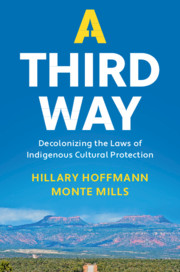Book contents
- A Third Way
- A Third Way
- Copyright page
- Dedication
- Contents
- Figures
- Preface
- Acknowledgments
- Introduction
- 1 Legal History and Foundations
- 2 The Jurisdictional Framework of the Second Way and the Cherokee Diaspora
- 3 Religious Freedom, the Value of Sacred Places, and the Price of Cultural Ignorance
- 4 Clashing Values, the Blackfeet, and a Measure of Success in the Badger-Two Medicine
- 5 Federal Cultural Protection Statutes
- 6 Tribal Laws
- 7 Both Ends of the Spectrum and Everything in Between
- 8 Indigenous Cultures and Intellectual Property
- 9 A Third Way for the Future
- Index
9 - A Third Way for the Future
Published online by Cambridge University Press: 16 July 2020
- A Third Way
- A Third Way
- Copyright page
- Dedication
- Contents
- Figures
- Preface
- Acknowledgments
- Introduction
- 1 Legal History and Foundations
- 2 The Jurisdictional Framework of the Second Way and the Cherokee Diaspora
- 3 Religious Freedom, the Value of Sacred Places, and the Price of Cultural Ignorance
- 4 Clashing Values, the Blackfeet, and a Measure of Success in the Badger-Two Medicine
- 5 Federal Cultural Protection Statutes
- 6 Tribal Laws
- 7 Both Ends of the Spectrum and Everything in Between
- 8 Indigenous Cultures and Intellectual Property
- 9 A Third Way for the Future
- Index
Summary
Deep in the heart of the Fort Peck Indian Reservation in northeast Montana, hundreds of bison now roam the rolling hills, grazing on the tall prairie grasses, wallowing in worn out patches of plains dirt, and representing the return of a vital, foundational element of the Tribes’ culture and very existence. Though the story of the Tribes’ effort to bring bison back to their homelands is only one of the many stories of cultural revival across Indian Country and beyond, it is emblematic of the changes to come, as indigenous leaders and their allies use laws to protect and empower their cultures. That story, like many, many others, is not just about the bison, their meaning to the tribes of Fort Peck, or the power that those massive beasts carry with them over their millennia of genetic memory across the continent’s Great Plains. Beyond all of that, the story of bison returning to Fort Peck and the future of indigenous culture and sovereignty are tales of promise, showing the pathway of new laws and legal structures that meaningfully incorporate, respect, and are shaped by those cultures. The fulfillment of that promise requires a reckoning with the core tenets and assumptions of the entire American legal system, an accounting that has long been denied by the rigid structures and inherent biases of that system. But just like the wild bison that now roam the fields of the Fort Peck Reservation despite the near extermination of their ancestors and the legal, practical, and other barriers to their restoration, the call for that reckoning will soon overcome the barriers that have historically prevented it.
- Type
- Chapter
- Information
- A Third WayDecolonizing the Laws of Indigenous Cultural Protection, pp. 151 - 160Publisher: Cambridge University PressPrint publication year: 2020



